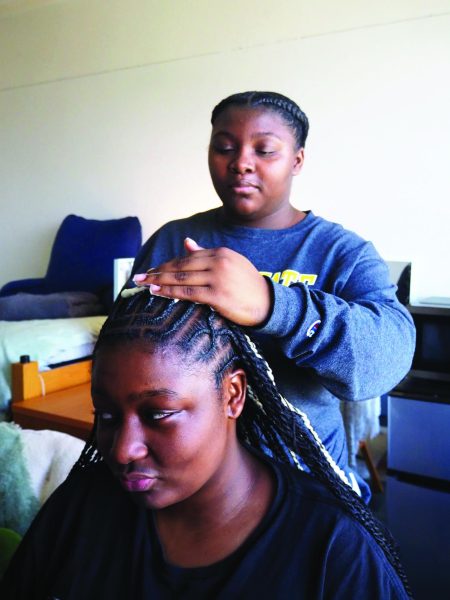Doctor doctor, give me the news
Doctors give advice on obtaining a Ph.D.
November 2, 2016
Dr. Andria Cooper, Dr. Dan Miller and Dr. Eric Colvard hosted a graduate and law school workshop on Oct. 26, with each giving their own experiences. All three are from different areas of schooling; Cooper from criminal justice/law school, Miller in psychology and Colvard in history. Although their experiences are different from each other’s, all were stressful yet rewarding.
“There’s a lot of steps to get into grad school,” Colvard said to begin the workshop. “Perhaps by the time that you decide to get into law school, you may not have given your provider enough time to take the necessary steps.”
His presentation was mostly giving a step-by-step guide to selecting your program of choice, starting with the expenses.
“It is kind of expensive and it’s best to have a plan ahead of time,” Colvard said. There are different levels of support, such as assisting in the school itself. Students may be paid for this and help take out a chunk of tuition. He said that you almost need to work within the school to pay for everything, but it also gives the ability to teach others with assisting with the classes, an ability that is always desired.
It is also important to select a few different schools, something the other two professors agreed with. Another agreement was to take advantage of the faculty and get to know them. One good contact can go a long way to getting into your preferred school or progressing farther, but make sure to contact sparingly. Speaking too often will bother professors who are busy with other things such as writing books or doing studies. Also, make sure that it’s a good program with a good staff. Students currently enrolled will help attest to that.
An always important item, though, is the letters of recommendation. Most schools will ask for at least three, but send only three. Quality is better than quantity when you have tired eyes on the council reading hundreds of essays, then seeing a stack of six in a folder. Chances are they will simply not bother. Cooper added that when asking for letters, make sure that you give yourself a buffer between the ‘deadline’ you give to a professor and the actual deadline of turning in the letters. This will give the professor and student room to breathe.
Miller spoke of his experiences of psychology schooling next. “Start off with a master’s. It will give you that edge into getting the Ph.D.,” was his first advice. While it is always best to shoot for the Ph.D., an institution degree may be a great foundation for schooling. He said that any experience you get will help you stand out.
Miller stressed that it won’t just be letter grades needed for graduate school. There will be original research or being in labs for semesters. That is all outside the normal curriculum, but it will assist in being a part of a lab or a team.
“First thing you need to know is that you don’t have to have specific courses to be able to get into law school. You do not have to be pre-law,” Cooper stated. It is one of the largest misconceptions of getting into graduate schooling, and Miller added that he had at first been a nursing major. Any experience can be useful, especially in law school. Law school expands to nearly every information in the world, from medical practices to the proper owner of an ancient painting sitting in an attic.
There is the large barrier between students and the graduate school of their choice: testing. This is extremely true for law school, which Cooper attended and described in detail. LSAT is the testing used for preadmission, or an entrance exam. There is a website to learn more of this testing, at lsac.org, where there is plenty of material to prepare for this test. This follows nearly all types of schooling through all types of majors, having different tests, but all with the same purpose: to put you on a spectrum of other students aiming to the same schools. There are some tests that automatically upload your score, such as the LSAT, and tell you just what schools would be a best match for admissions.
For those who are interested in law school, RLOP is a program for applicants to apply to get a seat into the UNL law school. This is only available for freshmen and sophomores, though, to give them a head start.
Although the three professors had different backgrounds they each of them told the similarities they experienced after graduating from their undergraduate schooling. Don’t feel too overwhelmed, though. Make sure that you have some fun while devouring entire law school textbooks to keep your sanity in place.








